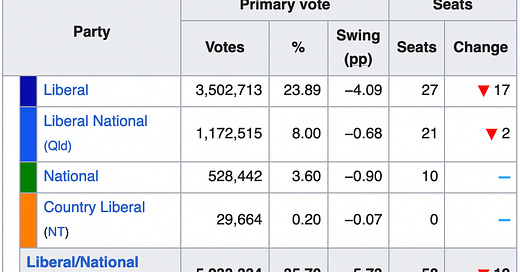The LNP has more democratic mandate than Labor
Receiving preferences doesn't mean receiving a mandate
(Note before reading: I prefer Labor to the LNP. I simply think Labor shouldn’t be dishonest about their actual mandate).
Recently, when challenged on willingness to negotiate with the Greens on climate legislation, Labor president Wayne Swan made this tweet, declaring that Labor’s election win gave it a democratic “mandate”:


However, there’s a conceptual problem with this that a lot of people have missed.
Because of preferential voting, winning a seat doesn’t equate to a mandate.
For example, suppose I support the Greens, and I vote Greens 1 Labor 2. Labor wins the seat over the Liberal candidate, thanks to my 2nd preference.
Electorally, my representative in parliament is Labor (they won my seat, thanks to my vote). But the party that actually represents my views is the Greens - they were my 1st preference.
To look at mandates in the house of representatives, you can’t look at the seat result - you need to look at first preferences, or the primary vote.
When we do, we see that not only does Labor not have a mandate from a majority of voters, they actually have less mandate from voters than the LNP.
How embarrassing.
And there’s another problem. While primary vote is the closest thing we have to knowing voters true preferences, many voters don’t put their true first preference first.
This is because of a phenomenon I like to call “preference short-circuiting”.
This is when a voter might, in the abstract, prefer the policies of a minor party, but knows that party isn’t going to win the seat. Instead, they put their preferred of the two favourites as number 1.
For instance, many Kooyong voters will have preferenced Monique Ryan first, because they knew that was where their preference would eventually flow anyway.
This also happens because many voters don’t understand the preferential system well, and think that a number 1 vote somehow has more power than a vote that comes from redirected preferencing.
In other words, voters vote based not only on their preferences, but often on their predictions of who will win too. This obviously favours the major parties, who are the likely winners in most seats.
But it means that the primary vote of the major parties likely overstates their true democratic mandate. Thus Labor’s democratic mandate is not only less than 50%, it’s less than 32% - Not much of a mandate after all.




